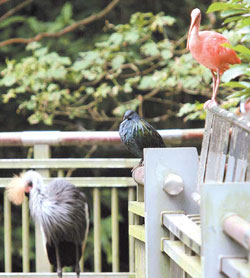News
Hsieh seeks to inform public on flu
2005-10-27 / Taiwan News, Staff Reporter / By Jenny W. Hsu
Premier Frank Hsieh (謝長廷) asked the Department of Health yesterday to set up an information network system on avian flu to allow the public to have immediate access to the latest news on the virus throughout the world.
 Birds in Taipei Zoo enjoy a day without the disturbanceof visitors yesterday. The Bird World section of the zoo is temporarily closed as a preventive measure against avian flu. /RICK YI, TAIWAN NEWS |
As avian flu is a global issue, many conflicting reports are been written about the virus, Hsieh said. In order to properly inform the public, it is extremely crucial for the media to broadcast the most accurate and up-to-date information on the virus, he added.
The premier also urged the public to suspend any unnecessary trips to China in the near future.
"The recent (flu) outbreaks mean that China is an affected country," Hsieh said. "In the past, China has not been transparent about disease conditions."
In a bid to upgrade the level of public information on the avian flu virus, Hsieh also asked the DOH to distribute to the public booklets or handouts on avian flu. The content should allow for basic understanding of the virus and educate the public how they can monitor their health and detect any early signs of the flu, he said.
Referring to reports of allegations by British authorities that a parrot which died held in quarantine in the UK was infected by birds from Taiwan, Hsieh thanked the local media as well the foreign news agencies such as the BBC and AFP for updating their stories by including Taiwan's concerns regarding the allegation.
"Before our birds left Taiwan, they were examined and declared disease free by the Council of Agriculture," Hsieh said. "The British health authorities have not provided any convincing evidence that the parrot contracted the virus from our birds."
In order to safeguard Taiwan's export market, a unified effort is required from all levels, the premier said. False reports of conditions in Taiwan will only undermine and tarnish Taiwan's national image and reputation, he added.
British allegations
On October 23, Debby Reynolds, chief veterinarian of British Department for Environment, Food and Rural Affairs claimed that since South America has not reported any cases of H5N1, the Suriname parrot that died in quarantine in the UK must have been infected while being exposed to a shipment of birds from Taiwan.
However, Lin Chun-yi, Taiwan's representative to the United Kingdom refuted the allegation in an interview with BBC Radio, saying it was groundless.
Taiwan is still a bird-flu free country, Lin said.
He pointed out that the since the parrot died on September 19,it could not have been infected by Taiwan birds because the shipment from Taiwan did not arrive UK until September 27.
He further argued that the Taiwan birds and the South American birds were kept in separate cages, therefore, there was no way of telling which bird was the original carrier of the virus.
Lin concluded the interview by saying Taiwan wishes to cooperate with the British government to investigate what really happened to the parrot and to exchange ideas on how to better establish an avian flu prevention system.
Yesterday, Chiang Hsien-choung, director of the Animal Quarantine Division confirmed the farm that exported the shipment of birds to Britain has no traces of the H5N1 virus strand.
"We sampled 40 birds on the farm in Taichung County and none tested positive for bird flu," said Chiang.
In a press release from the Bureau of Animal and Plant Health Inspection and Quarantine of Council of Agriculture addressed to the Taipei Representative Office in the UK, it states that "Upon receiving the news release of the UK, BAPHIQ has dispatched animal health inspection officers to the farm of the origin ... The results were negative, indicating that the H5N1 virus isolated from the Suriname parrot by the UK quarantine facility has no relation with the birds exported from Taiwan."
In the same document, BAPHIQ asked DEFRA to provide a detailed diagnosis report on the death of the birds from Suriname and Taiwan and explain why birds from two different countries were allowed to share the same space.
DEFRA has not made any formal reply to BAPHIQ's inquiry.
Meanwhile, the DOH has set up a Web site and a hotline to answer any questions the public might have regarding the status of avian flu at home and aboard.
The public is invited to go online at: http://flu.cdc.gov.tw or call 1922 or 0800-024-582 for the most current and accurate information on avian flu.
